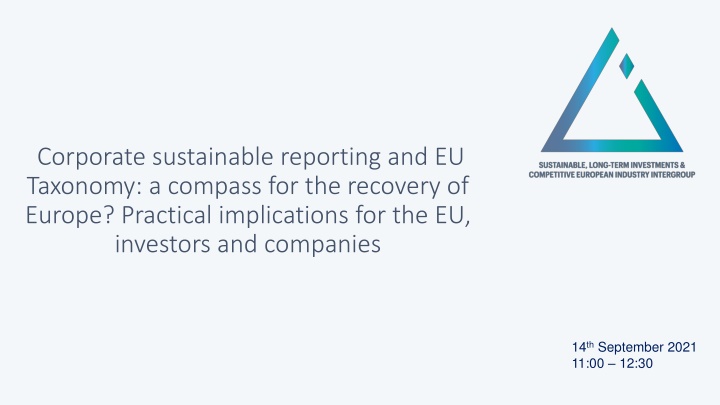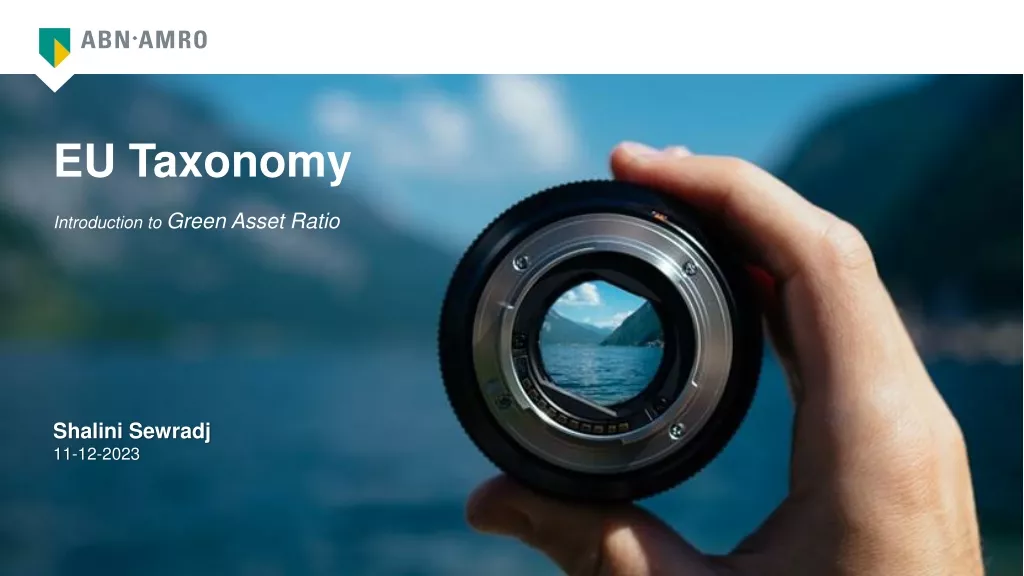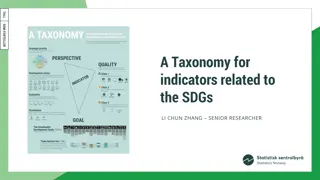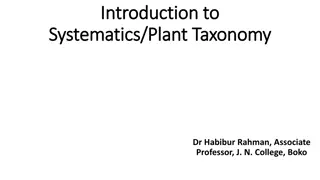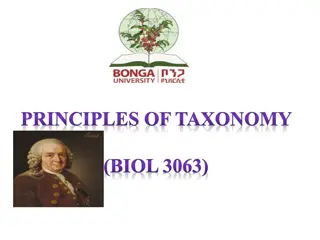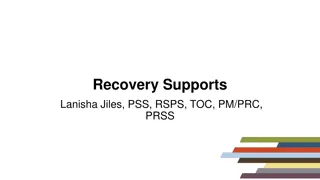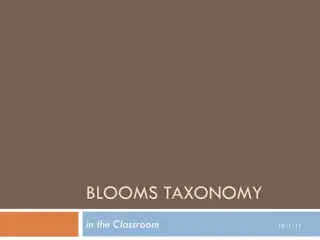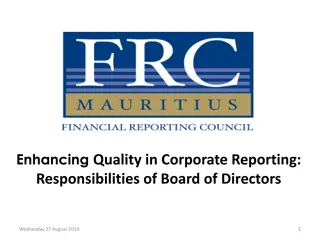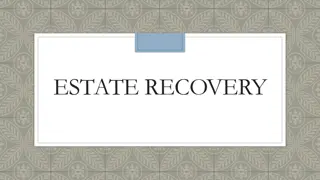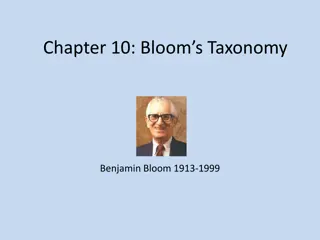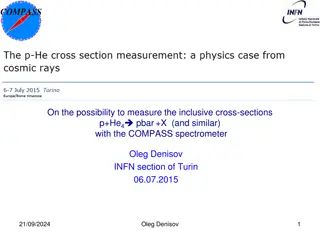Corporate Sustainable Reporting and EU Taxonomy: A Compass for Europe's Recovery
This event held on September 14, 2021, explored the practical implications of corporate sustainable reporting and the EU Taxonomy for Europe's recovery. Key discussions included the European Sustainability Reporting Standards, moving from preparation to the elaboration phase, and the role of various stakeholders in advancing sustainable finance. Notable speakers and panelists shared insights on the importance of reporting standards and sustainable finance for investors, companies, and the EU's economic future.
Download Presentation

Please find below an Image/Link to download the presentation.
The content on the website is provided AS IS for your information and personal use only. It may not be sold, licensed, or shared on other websites without obtaining consent from the author.If you encounter any issues during the download, it is possible that the publisher has removed the file from their server.
You are allowed to download the files provided on this website for personal or commercial use, subject to the condition that they are used lawfully. All files are the property of their respective owners.
The content on the website is provided AS IS for your information and personal use only. It may not be sold, licensed, or shared on other websites without obtaining consent from the author.
E N D
Presentation Transcript
Corporate sustainable reporting and EU Taxonomy: a compass for the recovery of Europe? Practical implications for the EU, investors and companies 14th September 2021 11:00 12:30
Preliminary remarks The event is recorded and will be shared. You can ask your questions to the panelists via the Questions box.
Welcome address Dominique Riquet MEP, Renew Europe Co-Chair of the Sustainable, Long-term Investments & Competitive European Industry Intergroup
Keynote speech John Berrigan Director-General of Financial Stability, Financial Services and Capital Markets Union, European Commission
Panel discussion : Corporate sustainable reporting and EU Taxonomy: a compass for the recovery of Europe? Practical implications for the EU, investors and companies Moderated by Laurent Zylberberg, Chair of the European Long-Term Investors Association (ELTI) Patrick de Cambourg Chair of the Autorit des normes comptables Michael Zimonyi External affairs & Policy Director, Carbon Disclosure Standards Board (CDSB) and Co- chair of the Informal Working Group on Sustainable finance Jana Bour European Policy Manager, European Public Real Estate Association (EPRA) Stella Benfatto Advisor Wholesale Markets - Investment Lead, Eurelectric
European Sustainability Reporting Standards: ambitions and roadmap High-level conference of the intergroup on Sustainable, Long Term Investments & Competitive European Industry of the European Parliament Patrick de Cambourg, 14 Septembre 2021
Moving from preparation to elaboration phase 3 efforts still running in parallel New mandate given in May 2021 to PTF-ESRS to implement the PTF- NFRS recommendations, in line with the key CRSD requirements 21 April 2021 Proposal for a CSRD 1 Q1/Q2 2022 European Commission Adoption CSRD Elaboration / Revision NFRD PTF-NFRS PTF-ESRS 2 Dedicated EFRAG Task Force 1st set of standards Preparatory work for standardisation February 21 Report Handover EFRAG JP. Gauz s 1st set of standards 3 Proposal for revised governance Reorganisation for early 2022 February 21 Report Preparatory phase Elaboration phase 7
The key CSRD requirements (1/3) The CSRD states the following (article 19b 1.): Those sustainability reporting standards shall specify the information that undertakings are to report in accordance with Articles 19a and 29a and, where relevant, shall specify the structure in which that information shall be reported. By 31 October 2022, adoption of delegated acts specifying the information that undertakings are to report in accordance with: paragraph 1 of article 19a (Scope and double materiality) and paragraph 2 of article 19a (reporting areas, intangibles, materiality assessment, time horizon). and at least specifying information corresponding to the needs of financial market participants subject to the disclosure obligations of Regulation (EU) 2019/2088 (SFDR). By 31 October 2023, adoption of delegated acts specifying (article 19b and 19c): complementary information [ ] where necessary; information [ ] that is specific to the sector sustainability reporting standards for SMEs Covering quality information and all topics (article 19b 2.). 8
are in line with the PTF-NFRS proposals and confirm the proposed target architecture . (2/3) The rule of three Three layers: from sector agnostic, to sector specific to entity specific Three reporting areas: Strategy, Implementation and Performance measurement Three topics: ESG+ and the appropriate reporting structure. 1. SECTOR AGNOSTIC 3 REPORTING AREAS Strategy, Implementation, Performance measurement 3 LAYERS 2. SECTOR SPECIFIC 3 TOPICS Environmental, Social, Governance+ 3. ENTITY SPECIFIC SUSTAINABILITY REPORTING Sustainability Statements 9
and roadmap (3/3) The enhancement of content approach Progressive depth of coverage on each topic Following sets not contradicting earlier sets towards the faithful representation reporting platform Following CSRD sets First two CSRD sets 10
Combining alignment with EU priorities and convergence with international initiatives Alignment with EU priorities is ensured via Thorough mapping and onboarding of current and expected European legislation and regulation resulting in sustainability information requirements Participation of the European Public Authorities (ESMA, EBA, EIOPA, BCE, EIB, EEA, FRA, CEAOB) to the PTF-ESRS clusters and Plenary meetings Regular connections with the Platform on Sustainable Finance to ensure proper alignment between the Taxonomy (existing regulations and more recent considerations and proposals) and the future sustainability reporting standards Contact with relevant European Commissions DGs under FISMA coordination While convergence with international initiatives is sought through Statement of cooperation signed with GRI and Shift, ensuring their representation and participation to relevant clusters Ongoing discussions with the IFRS Foundation and SASB towards cooperation as with GRI and Shift Informal and initial contacts made with the US SEC From a general standpoint, promotion of a co construction approach with willing international initiatives 11
Internal process based on consensus building and transparency, mirroring EFRAG s Due Process Initial prototype drafting by clusters Research and proposals under each cluster responsibility Working papers then shared with the whole PTF for review and consensus building (through review panel and tailored questionnaires) Revised prototypes presented and debated in Plenary meetings become V0 draft standards V0 draft standard submitted to initial and limited expert input V0 draft standard incorporating PTF comments then submitted for feedback and input to Expert Working Groups Back and forth work session between clusters and the relevant Expert Working Groups deliver a V1 pre-exposure draft V1 pre-exposure draft Result of interaction with the Expert Working Group becomes a V1 pre-exposure draft to be reviewed by the PTF prior to handover to EFRAG institutional bodies 12
Overall process and tentative timeline Step 1 Relaunch Step 2 Substance + V0 drafting Initial prototype drafted by clusters Review by a review panel and PTF-wide questionnaire Consensus building debates in Plenary meeting Experts & partners input Step 3 Expert Working Group s input V1 Pre- exposure draft Step 4 Combining internal consensus building and co-construction with international initiatives June 9 June 15 Oct 15 Nov 30 Early 2022 Handover to EFRAG Board and TEG
Key Challenges Ambitious timeline set by the draft CSRD First set of standards covering all topical and sector agnostic information by October 2022 Ramping up expertise and resources quickly enough 35 PTF members Initially the equivalent of 18 Full Time secretariat members, now 25 Possibly up to 30 after initial call for candidates issued in July Need for additional expertise in some areas to be delt with via the call for candidates for the Expert Working Groups Prioritisation of content in terms of depth and timing for set 1 and set 2 Capacity to promote elements of common international platform in a short timeframe Timing of handover to EFRAG still to be finalised 14
Panel discussion : Corporate sustainable reporting and EU Taxonomy: a compass for the recovery of Europe? Practical implications for the EU, investors and companies Moderated by Laurent Zylberberg, Chair of the European Long-Term Investors Association (ELTI) Patrick de Cambourg Chair of the Autorit des normes comptables Michael Zimonyi External affairs & Policy Director, Carbon Disclosure Standards Board (CDSB) and Co- chair of the Informal Working Group on Sustainable finance Jana Bour European Policy Manager, European Public Real Estate Association (EPRA) Stella Benfatto Advisor Wholesale Markets - Investment Lead, Eurelectric
Closing remarks Paul Tang MEP, Group of the Progressive Alliance of Socialists and Democrats
